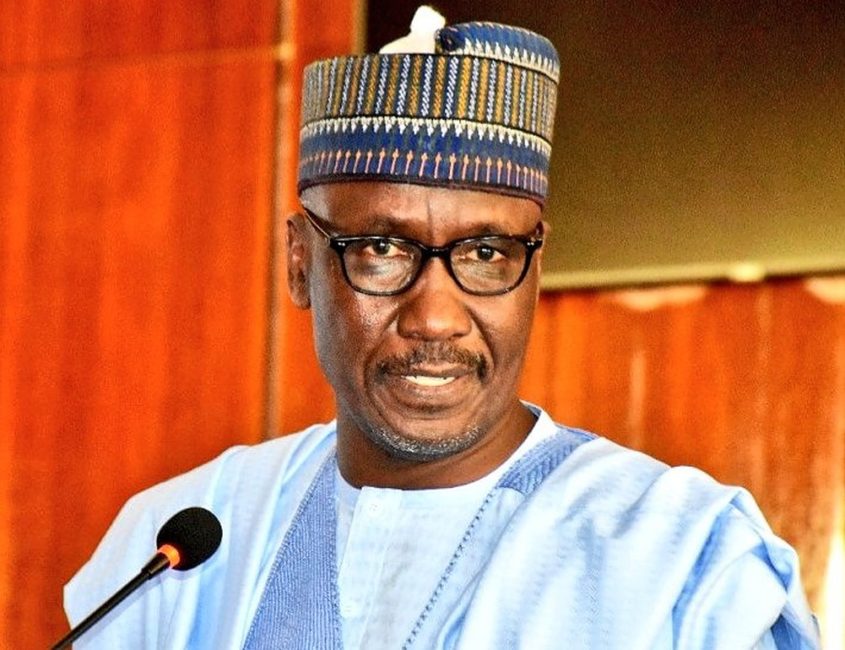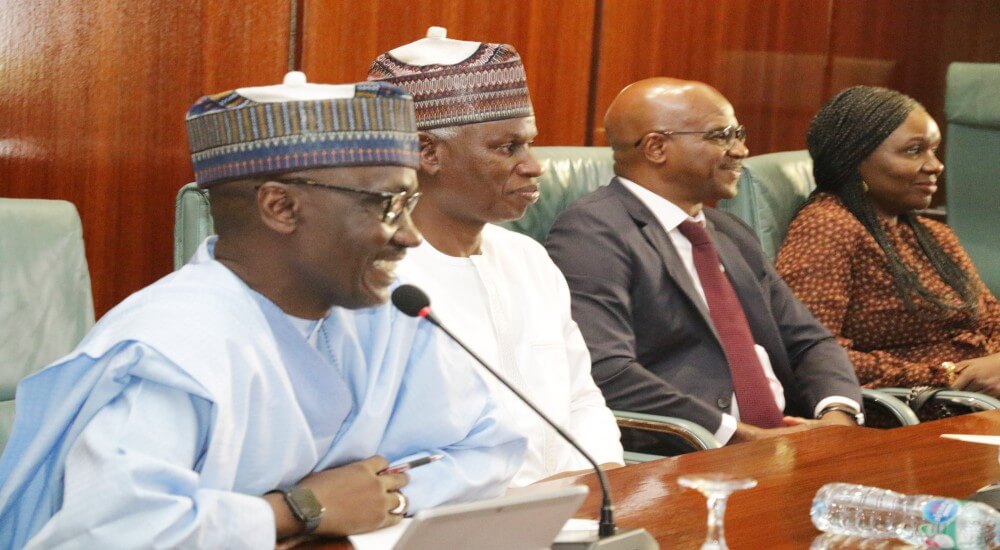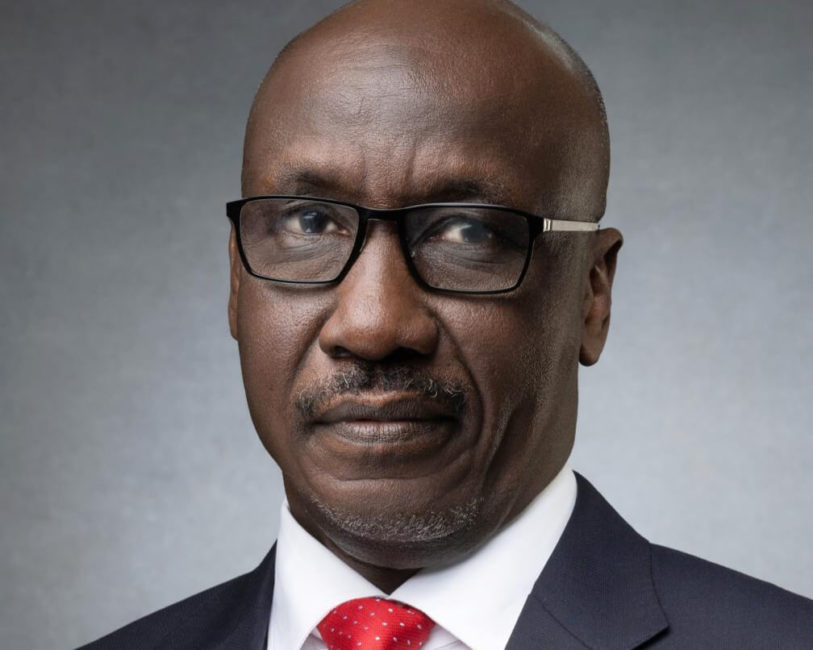INTERVIEW: Govt Will Name, Prosecute Every Criminal Stealing Nigeria’s Crude Oil–Kyari
At the 49th Session of the State House Media Briefing held on Tuesday, the Group Chief Executive Officer of the Nigerian National Petroleum Company Ltd Mele Kyari, spoke with journalists where he provided key updates on the vision of the newly unveiled NNPC Ltd; the recent interventions being put in place to handle the challenges of crude oil theft in Nigeria, and the recoveries made so far. THE WHISTLER monitored the interactive session and bring Excerpts…
The NNPC is carrying out rehabilitation of the refineries. How much has been borrowed and when will the completion be done so that Nigeria will stop importing crude oil?
Advertisement
We will restore Port Harcourt to 90 per cent installed capacity. We are borrowing from the Afreximbank and we are also borrowing a billion dollar for this purpose
Even if all our four refineries in three locations are operating at 90 per cent of installed capacity, they will only be able to raise 18 million litres of Premium Motor Spirit. That means even if all of them are working today, you will still have a net deficit of PMS to import into this country.
This is very practical. As a matter of fact, when we are done with our own refineries and the Dangote refinery, there remain other small initiatives that we are doing, small modular condensate refineries that we are building. If that happens and we are very optimistic it will happen, you would see that this country will now be a net exporter.
But we saw this energy transition challenge coming. We knew that time will come where you would look for people to buy your crude and you will not find. And that means we have locked down ability to sell crude oil for 33,000 barrels minimum by right for the next 20 years and by right also we have access to 20 percent of the production from that plant.
Advertisement
The combination of that and our ability to bring back our refinery will eliminate any importation of petroleum products into this country next year. You would not see any importation into this country next year.
As a matter of fact, it will be a hub for the export of petroleum products, not just to the West African sub-region. This will happen. The flow of supply will change by the middle of next year, it will change. You will not need the importation of petroleum products into this country by the middle of next year.
Is NNPC worried that the delay in asset sale such as the ExxonMobil- Seplat deal will hinder investments in the oil and gas sector?
Divestments is the right of any partner. As a matter of fact, the PIA allows the government to divest it’s interests in the Joint Venture today. So anyone can divest interest in any business and so divestments have rules, processes. We are now NNPC Ltd and a commercial company and we will do anything possible to protect our commercial interests and that will have nothing to stifling investments in the industry because we already have structures and processes that are in place to ensure that these assets continue to produce.So nothing has stopped. Change of ownership does not stop business.

Advertisement
Recently, we saw the NDLEA made arrest of a security top shot engaged in drug business. Why has the NNPC not named those arrested in connection with crude oil theft to restore confidence because this issue is now turning into a political affair?
We have made 122 arrests and and it is not NNPC that will make announcement of criminals and culprits. I know that name exists and they would be named, but the most important thing is to prosecute them and show the world that it is wrong to do this and if you do, the law will catch up with you. We will prosecute them and once we do, everyone will see them no matter who they are.
Please if you know them, tell us who they are now, I can guarantee you that they will not sleep in their houses today. No one is exempted, if it’s me, say it and I will not sleep in my house today. Everyone will be followed and that is why I’m saying that the EFCC will be following the cash, people who go and build houses without income, people who build skyscrapers without any legitimate business, people who buy cars that everybody know they cannot afford, lifestyle changes that you can’t explain, all these things are being followed and we know that the laws will catch up with this people and they will be disclosed and prosecuted.
The NNPC Ltd is now being governed in line with the Companies and Allied Matters Act. How will this new transitioning affect Nigeria’s Excess Crude Account and Sovereign Wealth Fund inflow?
The Excess Crude Account as you are aware is the difference between the budgeted sum and the available resources. So, it’s not an NNPC activity as our obligations is to deliver those resources into the federation account and we will do this. But the law provides that whenever there’s royalty on price which means that there is an excess value of price which is delivered, it goes into the
Sovereign Wealth Fund. Also, the Sovereign Wealth Fund by law can be funded either by the Excess Crude Oil Account or by any means that the national economic council decides to fund. So, there is no limitation to how the Sovereign Wealth Fund can be funded.
Commercializing the NNPC is a step in the right direction. But some people are of the view that this is half baked until the shares of the NNPC are listed on the stock market. How soon will that happen?
Advertisement
The NNPC Ltd is a much more compressed company today, a slimmer company that it will be and also because your financing partners always look out for your ability to have a system, a business model, a governance structure, that means that it will enable us have access to financing.
You are aware that the law clearly stipulates that this company’s interest can be diluted subsequently. The federation, the shareholders- you and me under the guidance of the National Economic Council, that we can dilute our interest instead of having a bulk interest held on behalf of all of us.
There can be private interest that can be held by individuals or companies in this company (NNPC Ltd). And this is very different. It will happen, because it is the requirement of Section 54 of the PIA which clearly stipulated that we can dilute the interest of this company
And for you to do this, you must be IPO ready. IPO ready means that you must have system, processes, organisation, transparency and also assets to back this up and also a business practice, a business model that supports this.
And I believe very strongly with what has happened now, with the things that have been done so far, we believe that by the mid of next year, this company will be IPO ready and we can dilute the interest of this company.
Of course, you can’t do this except you have clear vision and mission as a core value because our ambition is to be the dynamic global company of choice. Today companies and individual have choices. People decide where to acquire energy from.
You mentioned that the refineries are being rehabilitated. But recently, there were reports that the staff of those refineries were paid N136bn in salaries and allowances. What is the justification for that when there is no production taking place in those refineries?
There are two options. The first option is that when you have a refinery that is not working typically, you pull them down and move them into what is called a crate, and ask everyone to go home but the security men to watch over it.
The second option is to keep them as we are doing, and continue to lubricate the parts that needs to be lubricated. You test-run some of the part that you need to test-run, otherwise the day you need to use them it will fail you. It’s the second option that we are doing and we are not ready to bring them down into pieces. Typically, when you bring them down, it’s difficult to bring them back.
We know that we will bring them back into operation. That means you are keeping personnels who are to be paid. More than anything, the other implications is that you sack everybody that is there so that you can stop the salary and this also is a matter that have gone to the National Assembly. And the informed position that we have even by the clear wisdom of the National Assembly is that we can’t do this at this point in time.That’s why we are paying the salaries.
But we also minimized that by moving around many of the staffs to locations where they will be put into work, and we also have to do this as we know that ultimately the refineries will now be run next year.
So, there’s no need for that. Although there are retirements that are happening based on age, health and other factors and this numbers are coming down by virtue of statue requirements.
Some Nigerians are unable to reconcile the notion that NNPC Ltd is an independent company but with it’s board appointed by government. Can we have clarity to why is the board being appointed by government?
The board of companies are always appointed by shareholders, shareholders are always represented and this is typical. In today’s context, the Ministry of Petroleum Resources and the Ministry of Finance Incorporated is holding in trust for the federation but they cannot do anything except the shareholders agree which is the 200 million Nigerians. And that is why the PIA provided for a leverage which is now the National Economic Council to have a say in this process.
And therefore, the board of the shareholders by law is required that Mr President can appoint the board of this company on behalf of the 200 million Nigerians and that whenever you dilute interest even if it’s 10 per cent interest in this company, that right for government to appoint vanishes automatically, it will become a matter of its shareholders to include.

With the transitioning of NNPC to NNPC LTD, what happens to the outstanding FAAC remittances owed federation account?
To the best of our knowledge, we have reconciled our differences with FAAC, we have no liabilities that we are carrying forward into this new company. And as it is now, the NNPC is not remitting any money to the federal government. Also, we are providing Premium Motor Spirit to this country as a matter of commercial relationships between us and this federation. We are paying sub-market price for PMS as we all know. Some of you buy AGO, and you will know that AGO price is not always far from PMS price and you know what the price of PMS is. So, whenever you do this, and sell at some market price, once there is no direct payment to NNPC company, then the only way we can recover that cost is for us to hold back our physical obligations which is taxes and royalties so that we can use it to bridge that payment that is made on behalf of all of us as a matter of responsibility.
We are here also and the law requires us to provide energy security for our country and we must serve this country at our very best.

You spoke about setting up a national reserves company. What’s the timeline for the setting up of the company and how much in investments are you making since it would be managed under the Build, Operate and Transfer model?
Every country in the world has a national reserve company in a different manner and there are very many ways to do this. One is to require Petroleum Product Marketing Company to maintain minimum reserve in their depots on behalf of the State. Of course, that means that there is a holding cost and government must be prepared to pay for that.
The second way is for government to directly procure those products and keep them somewhere and that is why we have the network that we have, the pipelines that we have and the depots to keep them. And the intention is first to bring products close to consumers and secondly to maintain them at National strategic reserve locations.
So, we will bring back the pipelines so that these depots can serve its purpose. We have built another depots reserve facilities due for commission and the end result is that you now have the network of pipelines and depots that will now manage the national reserve on behalf of all us. It’s typically a government responsibility. It can be outsourced to private companies and can also be driven by agency of government. In some countries, it is done by the military. The military maintains the national strategic reserves of the petroleum product.
This is not the situation we are dealing with currently as we have established the national reserve companies that will be managed on behalf of the state on any decision that will be taken and there will be no contrary ways on how else we can do it.
Recently, there were news that the Nigerian Navy arrested a vessel off Nigerian coast with stolen crude oil and this is beginning to generate some form of controversy. Can you take us through what happened?
The vessel in question is the vessel that was arrested at the Equitorial
Guinea. If you can recall the vessel came too early and it couldn’t have been here outside it’s lake-can. Vessels can come and stay on international waters until you call them to come in. This is typical practice, it’s not only the vessel that does this, it is is a general typical practice and a very typical process.
Once vessels move into your territorial waters, then they become suspects. As at that point in time, we stated clearly that the vessels did not have clearance and I wrote to the Chief of Naval Staff that this vessel did not have clearance but that we knew that it was coming back. And it was also confirmed that this vessels did not load crude oil from the Apo terminal and this is very very correct.
The vessel in question has not pass through the required process before it came into our territorial waters. And the claimed they made was debunked by the Navy which we agreed was that they were afraid of a pirate attack and we also know that pirates attacks have minimized recently in our country and those incidents are very very minimal.
I am not sure that NNPC will ever facilitate stealing of crude oil and I have said it over and over again that the process of stealing of crude oil is beyond any one individual today. It’s end to end, from the producing companies, from NNPC personnel, from security men, members of community, every kind of people that you can think of, from elites in the society, everybody have some involvement.
Are they doing it on behalf of the institutions absolutely not, they are criminals everywhere and there are also good people everywhere. I believe that majority of my workers are good people and I’m not saying that there are no bad people in NNPC, they may be there and they will be part of the people that I told you, we will deal with them, government will deal with them and we will take them out.
How much of crude oil is being stolen out of Nigeria and when will this end?
Let us distinguish between issues, when you say you are loosing 700,000 barrels of crude oil per day we meant it. It is opportunity cost, there’s no company that will produce crude oil and then you loose 80 percent of that and then you continue to produce crude oil.
So, we deliberately shut down the pipeline when we see this infractions getting to a limit that we cannot control. As we speak today, we know for sure that there at least 700,000 barrels that could have been produced and we can’t do because we cannot guarantee the safety of the pipelines. Of course, there are some technical issues. Needless to say that not all 100 percent of that is due to theft, there are technical issues and we are responding to that but majority of that is due to crude oil theft.
As you may be aware, because of the very unfortunate acts of vandals along our major pipelines from Atlas Cove all the way to Ibadan, and all others connecting all the 37 depots that we have across the country, none of them can take delivery of products today.
The reason is very simple. For some of the lines, for instance, from Warri to Benin, we haven’t operated for 15 years. Every molecule of product that we put gets lost. Do you remember the sad fire incident close to Sapele that killed so many people? We had to shut it down, and as we speak, we have a high level of losses on our product pipeline.
You remember in Lagos when a fire outbreak happened on one of our pipelines? We discovered that some of the pipelines were actually connected to individuals’ homes. And not only that, with all sensitivity to our religious beliefs, some of the pipelines and some of the products that we found are in churches and mosques.



